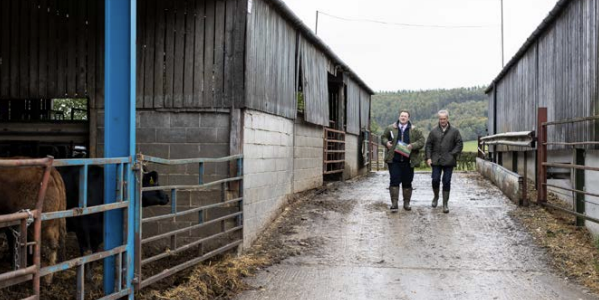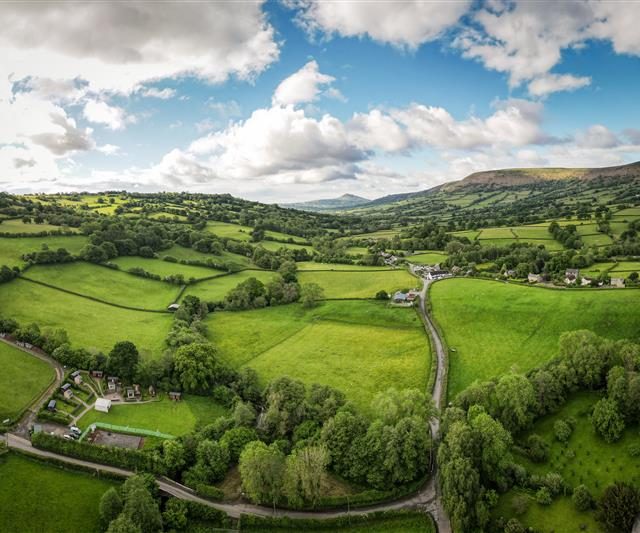What changes to rural policy would improve resilience?
What changes are needed to reshape and rethink rural policies to ensure UK farms and estates have the support they need to thrive?
We asked leaders across the rural sector to share their ideas for which path policy should take over the next two years to improve resilience and stimulate sustainable growth.
Please note the contributions in this article were written before the Budget on 30 October 2024, so while there are references to changes to the tax regime it does not reflect the full impact of recent announcements.
Jason Beedell
Head of Rural Research, Strutt & Parker
I have worked with estates for nearly 30 years, many of which have been in the same families for generations. What characterises many of them is stability and continuity, planning for the long-term, spreading risk through diversity of enterprises and incomes, and also, for many, a willingness to adapt.
Having thought deeply about resilience, not just for my clients but also about rural businesses and places more widely, I have come to the conclusion that the Government should try to think in a similar way to those successful multi-generational estates.
It starts with a deep understanding of the contribution that businesses, including estates, and rural areas can make to the economy, and also to the country’s social life and the natural environment.
Many of those contributions are costly to deliver and some address failures of the market and where the estate (or state) should step in. So there needs to be fair funding for rural areas so that they are not disadvantaged compared with other places.
One of the areas where the greatest boost to productivity, and therefore resilience, can be made is in connectivity, which means reliable business-suitable broadband and mobile reception, as well as roads and public transport options.
Finally, if we return to stability and continuity, a key role for government, at all levels, is to give clear and long-term signals on the direction of policy and the level and type of support available. This includes signalling how baseline regulations, including those on the environment, will change over time, and on what the policies aim to deliver. In England, we do not have that clarity in relation to policies on land use, food or the environment.
Without this, investment is lower and entrepreneurial energy is used in dealing with short-term issues and not planning for the long term.
Professor Jeremy Phillipson
Director, National Innovation Centre for Rural Enterprise (NICRE)
Support for innovation and entrepreneurship represents a key lever to boost resilience and stimulate growth in rural economies across the UK.
Rural firms, farms and land-based sectors are already adapting and making an impressive contribution in response to critical challenges facing the country. From tackling climate change and generating clean energy, to stimulating enterprise and employment and supporting the health of the nation, rural economies are a source of learning and shaping solutions that speak directly to the Government’s national missions.
At the same time, rural areas continue to face distinctive challenges and opportunities. Pressing labour and skills shortages are stimulating novel workarounds, but require more concerted attention. Persistent shortfalls in digital services, housing and transport availability continue to limit growth in rural businesses.
Infrastructure to support innovation in response to such challenges and opportunities – such as universities and other research institutions – is more concentrated in urban areas. Issues with digital connectivity and transport compound the disconnect with rural areas. Efforts to foster place-based innovation leadership and create investment zones also tend to have a more urban focus.
This imbalance can no longer be ignored if the Government is to harness the full potential of rural economies and realise its aspiration for sustainable and inclusive economic growth in all parts of the UK. Priorities for the next two years should include targeted support for rural innovation, enterprise initiatives and leadership; a visible focus on rural economies across government and the research and innovation ecosystem; and stronger relationships and collaboration across all places and sectors.
Victoria Vyvyan
President, Country Land and Business Association
This Government has promised growth but at the moment, in the rural sector, we’re not feeling the love. Banks are hardening their position on lending, interest rates are stubbornly high, and there is a chill wind blowing through the tax environment. CLA members are very nervous that careful plans to sustain multi-generational businesses are about to be thrown to the wolves.
Rural businesses are dynamic and forward-thinking, but the countryside economy is 16% less productive than the national average. Closing that gap could add £43bn to UK Gross Value Added (GVA) and the new Government has the opportunity to unlock this enormous potential and generate growth.
Simplifying the planning system – not just for residential development – is crucial to delivering economic growth. A CLA survey found 70% of respondents have been forced to abandon plans to invest in their business owing to outdated and under-resourced planning procedures.
Bolstering the farming budget is also key to kickstarting long-term growth and delivering on many of the Government’s environmental targets. The CLA is arguing for a budget of £3.8 billion a year in England and £1 billion in Wales; landowners can feed the nation and improve the environment, but they can’t do it on a shoestring budget.
It is important the Government does not ignore the need for improvements in flooding prevention and its response to flooding events. There are some of our recommendations, like giving Internal Drainage Boards more responsibilities, which would not incur additional
costs. However, the Government does also need to invest more in maintaining existing flood defences and in nature- based management.
David Webster,
Chief Executive, LEAF (Linking Environment And Farming)
After 14 years in opposition, the new Labour Government signals an important moment for UK agricultural policy. The past five years have witnessed an enormous shift in the farm subsidy regime, external geopolitical turbulence coupled with the effects of climate change, and Defra adjusting to life after Brexit. This has brought into sharp focus the vulnerability of the UK to external shocks in terms of food security.
Just as the UK Government is signalling tightening of the central budget, agricultural supply chains are coming under enormous pressure for productivity and efficiency. The adoption of management practices that utilise technology to drive productivity need to be accelerated.
There is a significant opportunity for government to align its policy goals with existing private sector-led supply chain initiatives to accelerate the adoption of environmental management practices at scale.
With the increasing specification of LEAF Marque certification by UK food retailers across their fresh produce supply chains, and the movement of the financial services sector to offer incentives to growers certified as LEAF Marque, we would like Defra to look at the opportunities to support the adoption of this and other accredited sustainability standards through earned recognition with existing schemes. Likewise, it could consider mandating recognised and accredited environmental standards for public sector procurement.
Finally, there are huge opportunities for the Government to support the wider food sector in our drive towards net zero by 2040 with more funding being directed into
agri-environmental research to facilitate greater connectivity in research funding between UK-based food producers and growers.
Martin Lines
Chief Executive, Nature Friendly Farming Network
The coming years will be crucial in building the resilient and secure food and farming systems society desperately needs.
Urgent and transformative action is required to fix systems that have become synonymous with declining food security, economic instability and ecological fragility.
It is time to recognise the importance of farming and land use in supporting a healthy, prosperous society. This means viewing land through a broader lens, harnessing its potential to produce food while also restoring nature, achieving net zero and driving sustainable economic growth.
Although the need for ambitious action is clear, the Government has yet to set out a pathway to secure a healthy food system or allocate a budget that fairly pays farmers while replenishing the environmental resources we all depend on. This is despite the rampant costs of continuing with business as usual and widespread public support for a new approach to farming and land use.
By investing in a clear, ambitious vision, we can secure a food system that delivers what we need from our land in ways that benefit everyone. Ambitious action for nature and climate is essential to supporting farming, food production, rural vitality and long-term economic progress. Healthy landscapes are vital to healthy people, and without fair, transparent supply chains, achieving net zero and nature recovery will be impossible.
A better future for farming is possible, but it requires ambitious commitments, bold action, and a long-term plan that embraces a broader view of food system success, recognising farming’s crucial role in supporting human wellbeing, economic progress and a thriving natural environment.
Laura Olliff-Lee
Head of the Salisbury office, Strutt & Parker
The provision of housing is a cornerstone of landed estates’ contribution to supporting their local communities and in many cases forms a significant portion of the total income to an estate.
Generating a return whilst keeping rent affordable for tenants and decarbonising housing so they will meet the forthcoming EPC minimum rating of C in 2030 are vital to ensuring long-term resilience on estates, but require investment in improvements, which can present a challenge.
The Government needs to ensure that it sets policy that takes account of rural property and the unique challenges it faces; rewarding the role that land and property owners play in housing the vibrant communities at the heart of a resilient rural economy. A good example is reviewing the residential EPC assessment, so that metrics can reflect the difficulties that rural properties face in practice.
Estates also want to see greater empowerment for local communities to deliver renewable energy schemes and small developments that can deliver quick changes for the local economy and address the immediate cost-of-living crisis that challenges the often-isolated rural communities that they support.
Finally, government needs to be more active in supporting the farming industry to address the difficulties of farmers’ retirement and access for new entrants and land managers wishing to use the land. This is going to be fundamental to the smooth transition for future farming generations and the advancement of innovative and sustainable land management.
The Earl of Leicester
Holkham Estate and chair of Wildlife Farms & Estates (WFE)
The tax regime matters hugely for resilience in the land-based sector. A low Capital Gains Tax environment and the availability of Business Asset Rollover Relief have for many decades facilitated transactions in the land market. Agricultural Property Relief has been as crucial, allowing the free transfer of land between generations of farmers – large and small – including on tenanted land, though in the latter case at 50% relief.
The strong argument against changing APR has always been that the law of unintended consequences could result, risking experience being lost if small family farms are sold to large institutions or investors less interested in farming.
Another priority is for the Government to recognise the multifunctionality of land, with joined-up policymaking across all departments. At Holkham we deliver food production alongside carbon sequestration, biodiversity, renewable energy, forestry, access, tourism, housing, office space and landscape.
We are invested in combining the stewardship and development of natural capital alongside food production, because we believe that focusing on soil health, connecting habitats and enhancing the environment is improving our resilience for future generations.
Our industry has never been under more scrutiny but, as a member of Wildlife Farms & Estates (WFE), we are confident we are following best practice and delivering positive environmental outcomes which are independently verified.
I would urge more landowners to investigate how WFE membership could help them to make more informed management decisions, based on an improved understanding of biodiversity and habitats. The scheme enhances public perception of the industry, while also helping to attract private investment to support further natural capital projects.
Charlie Taverner
Farming Futures Policy Lead, Food, Farming and Countryside Commission
There is a limited version of resilience: the ability to recover rapidly after a shock and to restore the status quo. That describes Britain’s food supply during the pandemic. Remember the panic-buying and empty supermarket shelves? Remember how veg and meat boxes, drive-throughs and other creative direct farmgate selling enjoyed a burst in popularity? Then, as the country creeped out of lockdown, we returned to our old shopping habits and the big retailers’ dominance was re-established.
But there’s a broader conception of resilience, one that can improve our country’s food system and help our rural economies thrive. It requires not just responding to shocks like awful weather and surging prices, but developing the capacity to adapt and grow in a more positive, equitable way.
To achieve this, we need the Government to invest in putting people and places at the heart of food and farming. In practical terms, that means long-term funding for farmers to transition to more regenerative, organic or nature-friendly practices and the peer-to-peer learning groups for farmers to learn from each other.
It means using planning laws and grants to regenerate the local food infrastructure such as markets, mills and abattoirs. It means enforcing rules that ensure fairness and transparency in all relationships across the supply chain. Crucially, we also need to help citizens reconnect with the food that’s grown around them.
All of this has to be flexibly and sensibly introduced around the needs of the UK’s patchwork of landscapes and communities. Rural resilience is not one-size-fits-all.
This article first appeared in our latest issue of Land Business. For more download the Autumn/Winter 24 edition of Land Business.






